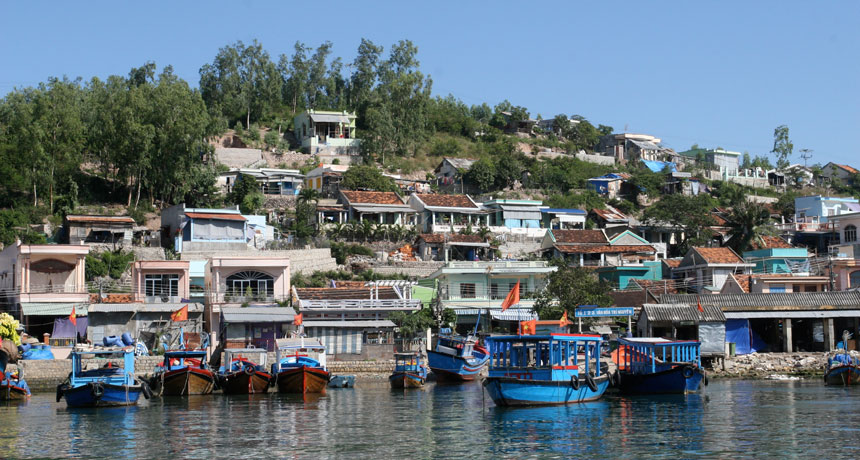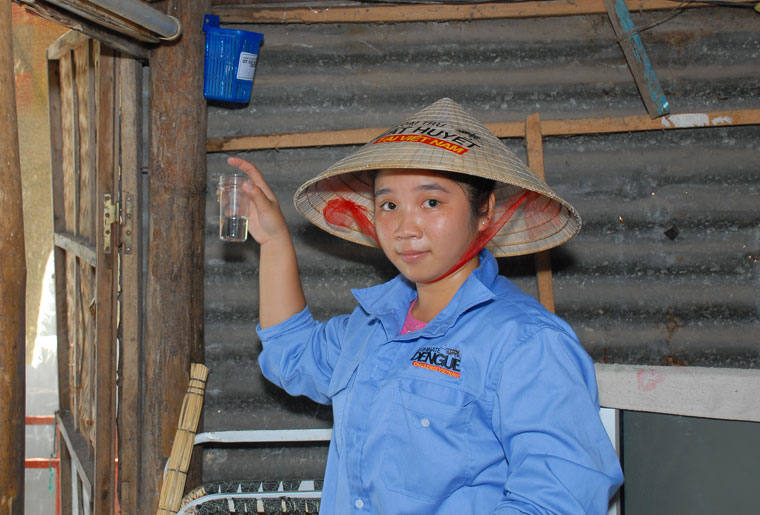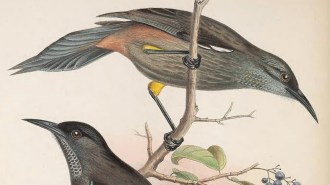Virus-blocking insects taking over Vietnamese island
Field trial tests mosquitoes that may stop the spread of dengue

INSECT HIJACK On Vietnam’s Tri Nyugen Island dengue-blocking mosquitoes now make up around 65 percent of the island’s mosquito population, a survey finds.
Eliminate Dengue Vietnam
WASHINGTON — A tiny island off Vietnam may soon be the first place on Earth where people are completely shielded from dengue, a potentially lethal viral disease that causes painful fevers.
The virus, which threatens a third of the world’s population, spreads by mosquito bites. In April, researchers released dengue-blocking mosquitoes on Tri Nguyen Island, home to around 3,200 people and — for now — dengue. This month, in the latest survey, the modified bugs made up about 65 percent of the island’s mosquito population. If the introduced mosquitoes reach 80 percent, people on the island will be protected from the virus, the researchers calculate.
“At the moment, it’s all looking really positive,” said lead researcher Scott O’Neill of Monash University in Clayton, Australia. O’Neill presented the trial’s results November 16 at the annual meeting of the American Society of Tropical Medicine and Hygiene.
But O’Neill cautions that it’s uncertain whether the mosquitoes will survive in the long run. “I think we’ll know in the next eight weeks,” he said.
Most efforts to curb dengue, including experimental vaccines and pesticides, have not been widely successful. O’Neill and his colleagues have worked for more than a decade to develop mosquitoes that thwart dengue virus (SN: 7/14/12, p. 22), which scientists estimate infects up to 390 million people annually. The team found that infecting mosquitoes with a group of bacteria called Wolbachia lowers or even eliminates the chances that the insects will spread disease.
O’Neill and his colleagues have been testing different strains of Wolbachia to find the combination with the best dengue-blocking potential. In recent field trials in Australia, O’Neill and his team found that some versions of the dengue-blocking bugs could replace wild mosquitoes. But the type of modified mosquito that the researchers released in Vietnam, which was best at blocking dengue in the lab, failed in the Australian field test. After just a few months outdoors, the mosquito numbers crashed to zero.
The failure drew skepticism toward the approach. Dengue expert Scott Halstead of the Uniformed Services University of the Health Sciences in Bethesda, Md., worries the mosquitoes require more lab work before they will be ready for big field trials like the one in Vietnam. “It’s going to take more fiddling,” he said.
But O’Neill isn’t concerned. The Australian trial failed, he said, because the modified mosquitoes didn’t survive the country’s dry season; Vietnam has wetter conditions.
The researchers think the mosquitoes died because of their Wolbachia infections. The bacteria shove out other microbes, such as dengue virus, from the mosquitoes’ cells but inadvertently weaken the insects, making them more susceptible to stressful conditions like a drought. The bacteria also make the mosquitoes live shorter lives. Elderly mosquitoes visibly tremble and have trouble biting. On Tri Nguyen, they’re known as “drunken mosquitoes,” O’Neill said. “They look like they’re staggering around.”

But so far the modified bugs are living long enough on the island to transmit the bacteria to new generations. Infected females pass the bacteria to their offspring. In males, Wolbachia alters sperm such that offspring die when an infected male mates with an uninfected female. So infected offspring begin to outnumber, and eventually replace, uninfected ones, which is exactly what’s happening on Tri Nguyen.
Starting in April, researchers and volunteers released young infected mosquitoes in people’s homes weekly. The island’s residents, eager to get rid of dengue, agreed to keep cups containing infected mosquito pupae in 95 percent of the island’s 835 houses.
After 23 weeks, researchers had released around 350,000 juvenile mosquitoes. Then researchers collected mosquitoes every week to monitor the ratio of infected to uninfected bugs.
By September, the infected mosquitoes made up around 85 percent of the population and the group stopped releasing more. But then the numbers dipped and are now hovering around 65 percent. O’Neill wasn’t surprised by the decline but hopes the numbers will jump back up in coming weeks.
If the mosquitoes do crash as they did in Australia, O’Neill has a backup plan: newly developed mosquitoes infected with Wolbachia that aren’t as sickly.
For now he’s happy to note that the island hasn’t had any dengue cases since the trial began, though the researchers don’t yet know whether this is unusual.
Enthusiasm for the approach is spreading. “It’s very exciting,” said Laura Kramer, who studies mosquito-transmitted viruses at the New York State Department of Health in Albany. “They’ve made tremendous progress.” O’Neill and colleagues are planning seven other trials across Asia and South America. “We’re being inundated with requests,” O’Neill said.
Even if the mosquitoes don’t single handedly stop dengue on the island, they are still a powerful tool, said Harvard’s Thomas Monath, who helped develop a dengue vaccine now being tested. “Dengue control is going to take more than one approach,” he said.
Editor’s Note: An update to this story appeared on December 13, 2013.






